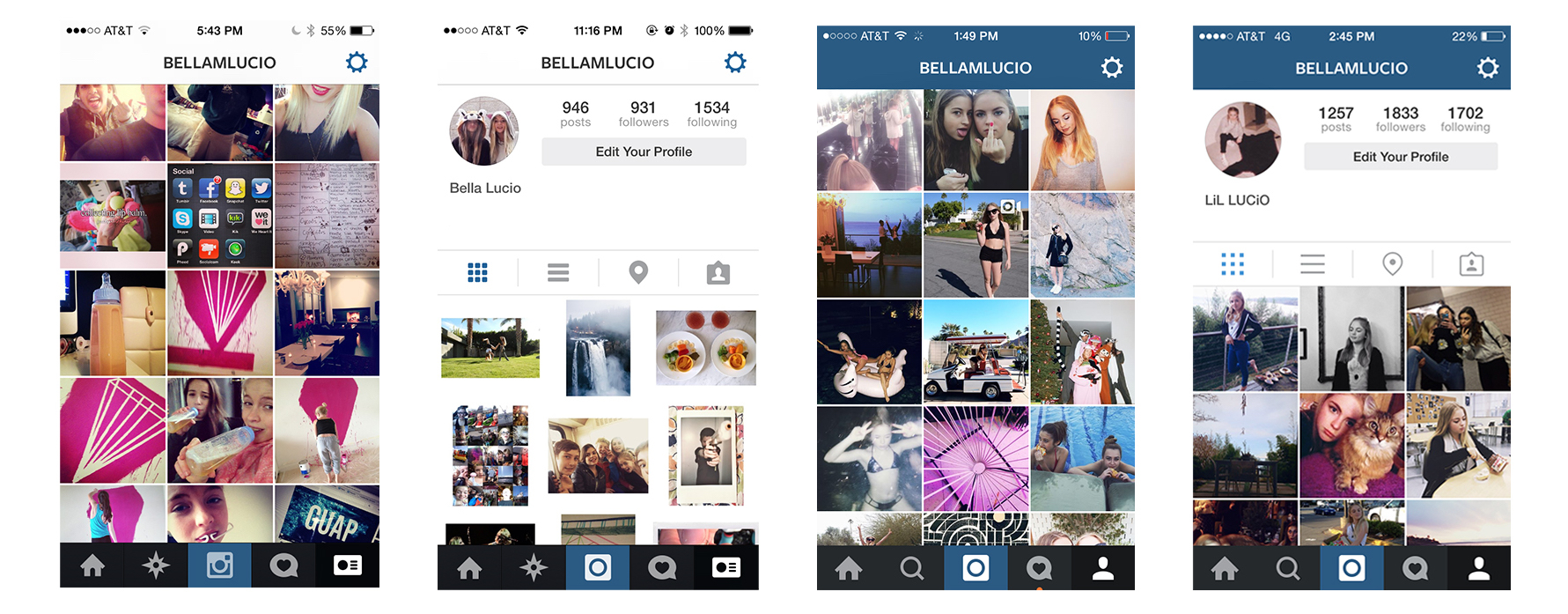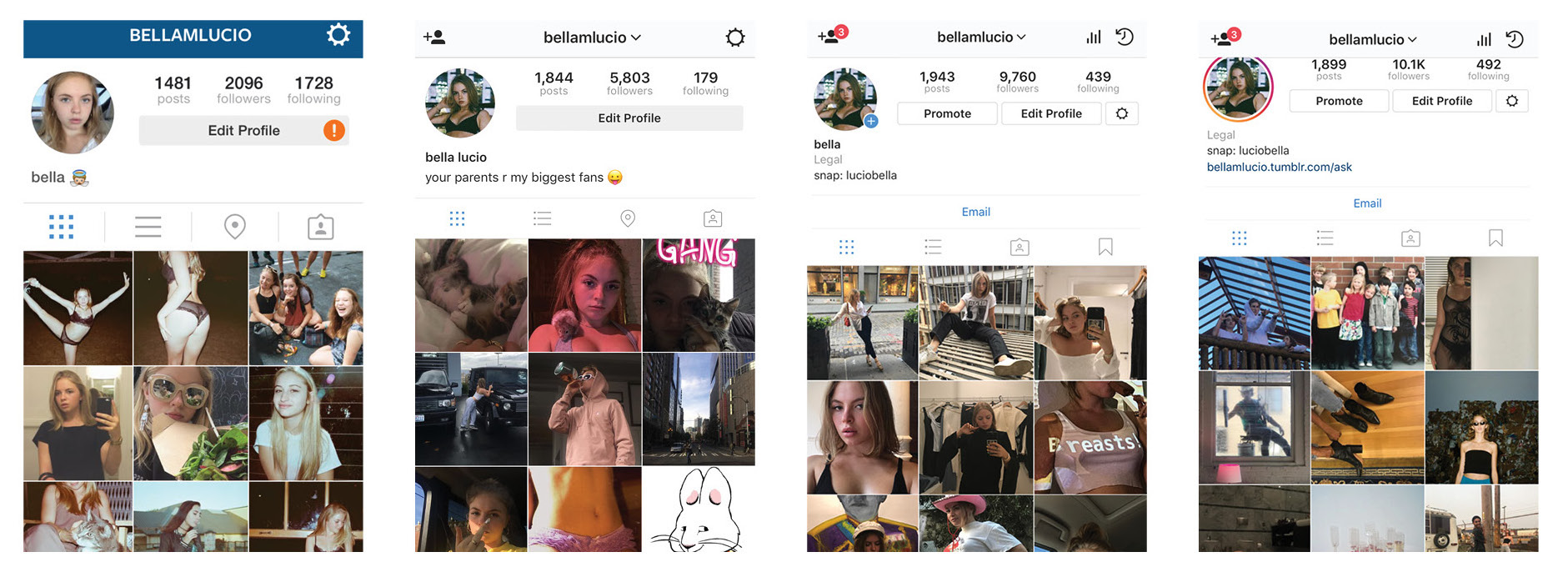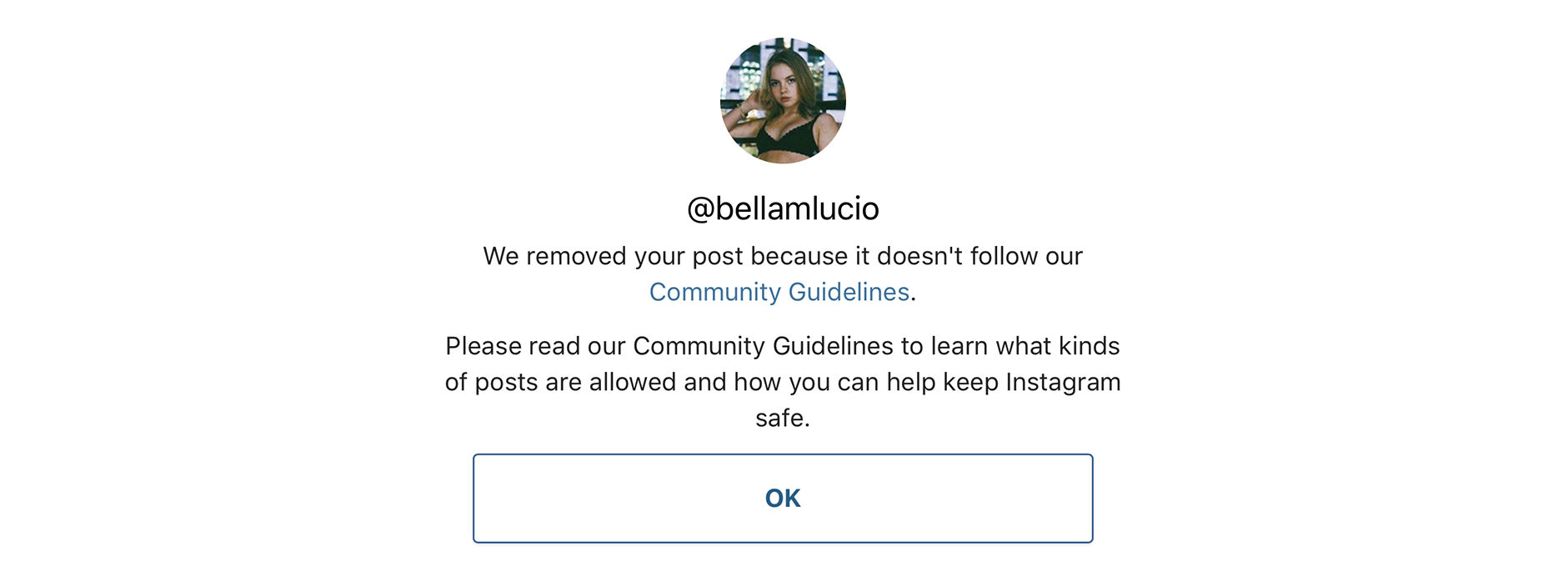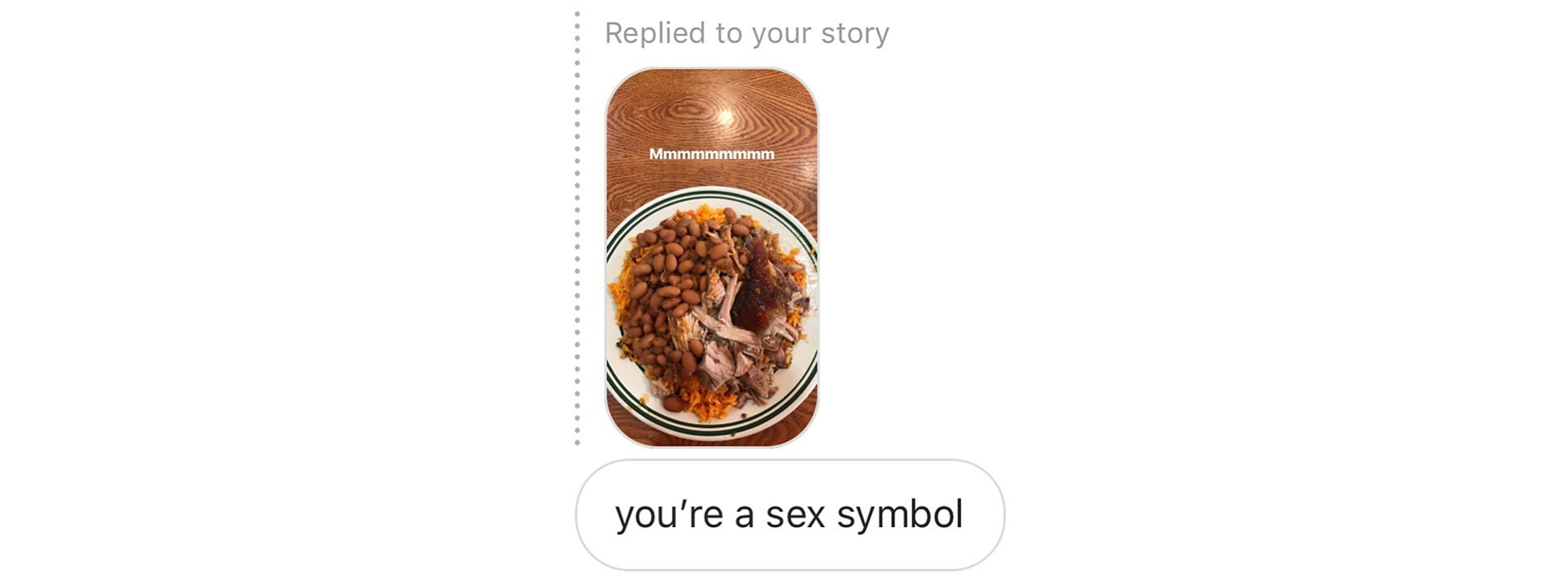The Rise and Fall of @bellamlucio
APRIL 24, 2021

Instagram significantly affected my upbringing and formative years, a theme prevalent in my generation. The way people poured their lives out for the public eye to see brought me solace. People were making their lives seem cool, and I truly believed my cool was authentic, so I viewed the internet as a way to make people “understand” and ultimately agree; I was cool.
I had amassed almost ten thousand followers by the time I was sixteen, but rather than the public eye viewing me, eighty percent of these ten thousand people were my peers. People I attended school with, people who had heard of me, mutual friends, and even parents. Most of these people were not supportive of me as an individual, but they wanted to keep tabs on me, digital voyeurism.
I was a spectacle, open 24 hours, I was easily consumable but not palatable. Spending my formative years being viewed, criticized, and labeled: my Instagram, a proverbial glass house.
Slut, heathen, jailbait, drug addict, prostitute, trust fund baby.
I did not have a separate identity from my Instagram, because it was me; I was bellamlucio. Still, my confidence and sense of self built on social media were not real. My digital identity began to act as a script for the false narratives I was supposed to follow in my real life. Rather than rewriting the public narrative about me, I chose to play the role I was assigned.
Up until this point, I had used Instagram like a regular middle schooler, my boyfriends’ and best friends’ names in my bio, and misc usernames to the tune of @guccigangbella.

I had always been a very performative person, and I loved social media. The sentiment, “The internet is forever,” was all the more reason to be involved. I never posted anything I did not want to, I was always genuine and meaningful with my image, and I never tried to brand myself as someone I was not.
Instagram gave me a lot of false hope. It conditioned me into thinking followers and likes and comments were success, or they could be. Even if they didn’t translate to success it did feel like gratification, and as a child, I sometimes dreamt of fame. Not because I wanted it but because I felt that it was inevitable, no matter what–I would be famous.
And I somehow so effortlessly began to find not fame, but notability, on the internet. I did not think that what I was doing or posting was that interesting or outrageous, but apparently, it was. I was very privileged to have the life and the confidence that I did and I think that whether they hated or loved me, people were intrigued.

For as long as I can remember, I have been notably sexualized, and I think that was obvious in the way I presented myself online. In seeing myself overly sexualized, I shaped my identity around my sexuality, spending the latter half of my childhood focused on sex appeal. Rather than making myself a victim, I normalized this behavior to cope.
I thought the only way to maintain my following, was to take my clothes off. So I coined it, I weaponized the sexualization I was already facing, in hopes of gaining something from it. I conditioned myself into thinking that accepting I was “sexual” was feminism. I spent my formative years believing this is what I could offer the general public–my half-naked body. Relying on shock value and the cultural phenomenon of nudity in the name of “defying the patriarchy.”
Until I stopped seeing it as “empowerment” or “defiance.” I developed a consciousness that I needed to keep up my appearance, which was now based in nudity. I was comfortable with my body, I did like feeling hot and seen. But, I am much more. I had more to offer, and I didn’t out of a fear that nobody cared.
While navigating my youth on and off the internet I would often ask myself “Would I rather have a ton of friends for the wrong reasons or no friends at all?” and I think the same question could be asked about a social media following. It took me many years to conjure up an answer, as I ignorantly wanted to believe that people liked me for me, and that my following was authentic.
I wanted to be liked, not by my followers, but by real people, and I think that because of my internet persona, people did not meet me without a prejudice. People entered my life with preconceived notions about me and thus an ulterior motive to be in my life, making so many of my fleeting relationships counterfeit.
The thousands of “friends” I had on social media hated me as well, but they couldn’t look away, it was like a car crash. What I was putting on the internet was appealing and conversely so easy to loathe. And I couldn’t understand why people continued to follow me while detesting everything I shared.
Until I came to realize “succeeding” on Instagram was all opportunity-based, a fantasy that people aspire to be a part of or a fantasy that they resent. I was a fantasy people could resent.
Instagram, and the presentation of self on the internet, is truly based in opportunity, you have to be extremely opportunistic to create a genuine Instagram following.
But if you have the opportunity to live an extraordinary life, all you have to do is broadcast it, and that’s it. That is what every “Lifestyle Influencer” and “It-girl” is doing on the internet, they are exploiting attributes offered by immediate circumstances.
You live the fantasy, and broadcast the illusion that your life is effortlessly awesome by tapping into the elements of it that are both unachievable and appealing to the general public–a “perfect” body, a “perfect” face, the “perfect” closet, prominent friends, and extraordinary opportunities. That is what makes social media a heirarchy that is so toxic, so fabricated, and ultimately built on classism.
I was a small part of the problem to project this tailored fantasy. In reality, I had no friends, a ton of self doubt, and I was terrified of succeeding and being liked, just like everyone else. But I knew, that is not what people want to consume, because that’s the reality they are avoiding too.
I had followers because I had access to money and a willingness to get naked. I broadcasted a life that facilitated distraction and perpetuated the social media hierarchy.
There was nothing positive nor beneficial coming out of my account, and my presence on the internet was never necessary. Girls have messaged me and told me that I helped them feel more confident or “body positive,” but I personally have never seen a hot girl on the internet and felt more confident in my own hotness. I believe I was always doing more harm than good.
I would not have been able to step away from social media on my own accord. Despite recognizing I was dispensable, I was still posting.
So when my Instagram was deactivated, I kind of felt relief. I wasn’t mad, and I didn’t feel like I was being “silenced,” as I never had anything to say.

To say that after all of these years I was going to use my platform “for good” is meaningless. I did feel like I could get somewhere in real life with my internet existence, like I could turn it into a career or use it to build a career. But there was nothing left for me on social media.
Everything that I thought I gained from Instagram was part of the illusion. My following never paid my bills, never got me a job, and never improved my life in a way that I couldn’t off of the internet. I didn’t feel the gratification that I used to, and I truly did not desire fame like I used to. Nobody cared anymore, myself included.

I came to terms with the fact that a lot of people in my real life didn’t desire my friendship anymore, simply because I didn’t have 18k. Meanwhile, my followers didn’t care where I went or what happened to me. I existed beyond the internet where they couldn’t see me, so I simply didn’t exist.
A few days after my deactivation, I was out at a club and someone said that I “looked awfully chipper for a bitch without an Instagram.” A sentiment that only made me realize how devastated people wanted me to be. Some people wanted my only redeeming quality to be a social media profile, and I refuse that.
I was chipper for a bitch without an Instagram, because I lost nothing when I lost my account. My Instagram was never facilitating who I am, it was just broadcasting it.
